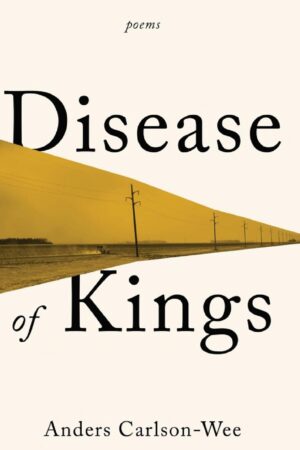Disease of Kings
by Anders Carlson-Wee
reviewed by Erick Verran
A noted train-hopper and urban Spartan, as likely to be supported by grant money as a Whole Foods dumpster, Anders Carlson-Wee has freeloaded through vast swaths of that post-industrial landscape eulogized by Philip Levine—of switching stations and abattoirs, rail and cattle—without inheriting the latter’s smug dressing-down (though I suspect he, too, eats his apples core and seed). Carlson-Wee knows what work is, although—or due to knowing—he’d choose its nobler opposite, what his ex-preacher mother tenderly calls “stewardship of the Earth, / the saving of small parts of God’s / creation.” It’s easy to gush at authenticity when artists are keener to burnish their social-media bona fides than mend a fiberglass boat or fake a bed-and-breakfast. At a line, Disease of Kings can seem calorically poor and indebted for its quirks to the huge friendship at its center. Soon, however, this new collection of poetry shows itself to have metabolized through years of sideways living and honest thought.
A successful writer ducks, if they wish to, the alternative of being spiritually a scrivener, underpaid cog in a hot Michigan factory; but then Levine’s brother loved Wagner. No, the truer forebear here is Les Murray, that Australian genius who dedicated every book to the glory of God, compared the poverty of his childhood with Keats’s, and used to loot supermarkets during “a patch of free-form living,” with “flat food round the midriff, long food up your sleeves” (“Employment for the Castes in Abeyance,” from Learning Human). Being indigent on purpose, as the fulfillment of an artistic wish, may disquiet readers when commiserating strangers hand Carlson-Wee cash. Like Thoreau on his pond, who reportedly crept home each evening for tea and a slice of pie, a parent is always within reach: “I caved and made the call, / my dad covered most of the summer, / treated the three of us to dinner.” These are a diarist’s tales adapted from life lived on- and off-grid, or thereabouts. One gets the feeling that its pages were typed out by blistered fingertips:
In every memory you wear the same
threadbare sweater. Hem stained
with huckleberries and Pennzoil.
Elbows worn through, then darned,
then worn through again. Giving way
at both shoulders, the seams
leave stitches loose in midair.
The collar is almost severed—
it hovers above the chest
like a necklace.
Carlson-Wee treasures “trash”: a soda-fountain cup, bagged tea, some persimmons. Appraising life’s dregs, he also relies on a lyric calm that avoids quite totally the filigree of what is merely pretty; lush description and other kinds of mood-painting are traded for the greater immediacy of the concrete. Here, that’s midwestern detritus, a few memorable individuals, and the schemes drummed up between them. The attitude differs from certain of Carlson-Wee’s streetwise contemporaries, who grease their verse with a sort of bookish machismo—the truncated slang that tells us a writer is haunted by lousy jobs, alcohol, changing a flat tire or two—and seem to take rundown apartments for the cachet of later saying they did. The collection’s obvious homoerotics, which flirt with Miltonic enjambment (“I watch him / wash tomatoes. He’s so gentle / with them, I have to look away”), are, thematically, classical: the pupil’s schooling is in camaraderie, a Copperfield admiring his Steerforth (Carlson-Wee’s live-in doppelgänger, a fellow scrounger nicknamed for a cardinal direction).
These quietly tough—calloused?—adventures are broken up by monologues that, for the sake of added vernacular color, distract from the real story; like walk-on parts in a variety hour, they’re at best clever divertissements. Couldn’t Carlson-Wee throw his voice narratively, without all this ventriloquism? Perhaps because the poems themselves, loose webbings of time and place, are far from technique-obsessed, the occasional internal rhyme feels a tad careless (“She loved that horse. She’d lose, of course / and go make cookies with her losses”), as do strings of assonance when they stand for a subtler music (“In the shallows, icefishing / tents sit darkly in starlight, / pitched far apart like farms”). Disease of Kings goes light on the rhetorical fireworks, preferring the natural magic of facts recollected as they happened. Carlson-Wee’s voice, almost synonymous with his style, is genuinely cautious, even shy; for language may be apprehensive with an author’s inexperience or, in hindsight, wince. Conversely, questioning statements rake each page with an athletic sureness that, to its major credit, never succumbs to the breathlessness with which the reflexively sentimental talk about hunger or fatherhood. He’s too exercised for that.
Aristocratic diseases, what the rich get (along with nearly everything else, one might say), once included gout, a type of inflammatory arthritis. Which, then, is the disease of today’s effete, economically immunized Caesars; and who is American royalty? The remaining Kennedys? Lana del Rey? If desirous of what it already has well in hand, and thus tonally somewhat innocent, Carlson-Wee’s monarchy of the self, home-ruled and without borders, is impressively distilled in his shorter poems:
To suffer none of it.
Money, work, or obligation.To face the days free
of roles. No title. No position.To get by on found food,
castoff clothes, scams
and hustles and handouts.To wonder about judgment
less than about stealing
the time it takes to wonder.To have stolen time. And be lost
on how best to squander it.
It is the Pascalian conclusion that a king, tangled up in laws and ownership, is less at liberty than, not the lowliest member of his realm, but a romantic impossibility: the stateless man, whose sole burden is the body’s want of sustenance. That, and human company.
Published on November 16, 2023

